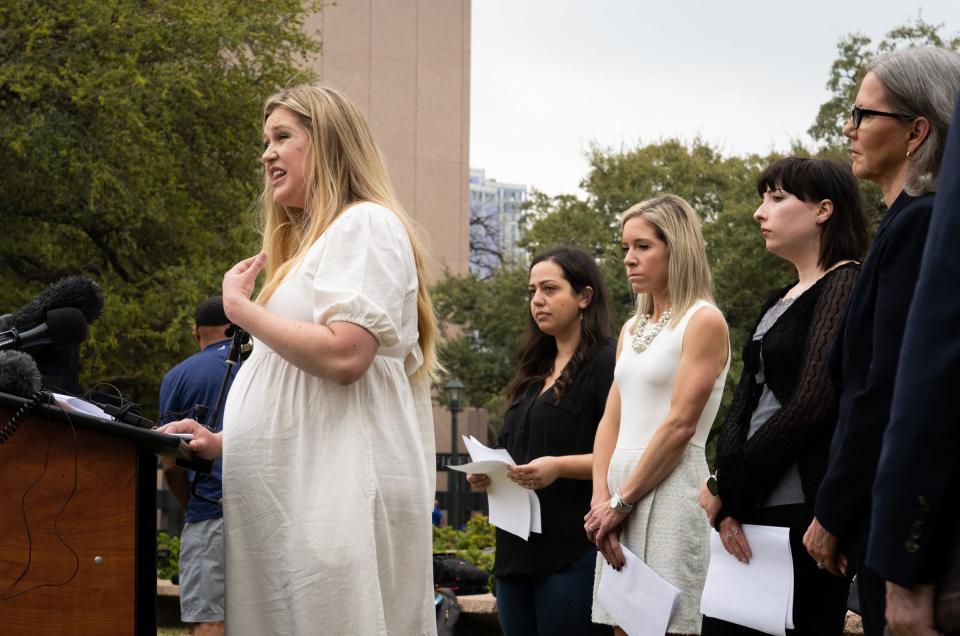Travis County judge sides with Texas women denied abortions after dangerous pregnancies
A state judge in Travis County ruled Friday that abortions in Texas are lawful in cases of dangerous pregnancy complications, including fatal fetal diagnoses, and that doctors cannot be prosecuted for using "good faith judgment" on when to terminate a pregnancy.
The injunction from District Judge Jessica Mangrum, which the state immediately blocked Friday in filing an appeal, comes two weeks after four Texas women came to her court to give emotional testimony about not receiving an abortion, even as they suffered physically and after doctors deemed their pregnancies incompatible with life. It marked the first time women denied abortions have sued a state since the U.S. Supreme Court overturned Roe v. Wade last summer.
The ruling does not apply to elective abortions, which remain illegal in Texas under the state's near total abortion ban.

Though the injunction is a victory for women's rights advocates, the case is far from over. Within hours of Mangrum's ruling, the Texas attorney general's office filed an accelerated appeal to the Texas Supreme Court, overstepping an intermediary appeals court. The appeal automatically blocks the injunction pending a further ruling.
In court last month, the state's lawyers argued that the patients were failed by doctors who couldn't interpret the abortion ban, not by politicians who in 2021 passed the ban under Senate Bill 8.
Brent Webster, first assistant with the attorney general's office, released a statement Friday calling Mangrum's injunction "an activist Austin judge's attempt to override Texas abortion laws."
In her ruling, Mangrum, a Democrat elected to the bench in 2020, clarified the circumstances under which a termination is allowed. Those circumstances include:
A fetal condition where the fetus is unlikely to survive the pregnancy and sustain life after birth.
A physical medical condition that is exacerbated by pregnancy, cannot be effectively treated during pregnancy or requires recurrent invasive intervention.
A physical medical condition or complication of pregnancy that poses a risk of infection, or otherwise makes continuing a pregnancy unsafe for the pregnant person.
The Center for Reproductive Rights brought this case on behalf of 15 plaintiffs — two OB-GYNs and 13 Texans who suffered severe pregnancy complications but were denied an abortion. Lawyers and plaintiffs pleaded with Mangrum to provide additional clarity beyond the state law, which says a termination is allowed only to save the patient's life. The law is uncertain, they argued, about how close to death that patient must be before a termination can be granted.
Amanda Zurawski of Austin testified that she spent three days in intensive care in August 2022 after her water broke prematurely and she was denied an abortion. Zurawski said that she developed sepsis, a life-threatening condition, and suffered permanent damage to her reproductive organs that could prevent her from getting pregnant again.
Zurawski, the lawsuit's lead plaintiff, issued a statement Friday, saying she cried when she heard the injunction was granted.
“This is exactly why we did this," she said. "This is why we put ourselves through the pain and the trauma over and over again to share our experiences and the harms caused by these awful laws. I have a sense of relief, a sense of hope, and a weight has been lifted. Now people don’t have to be pregnant and scared in Texas anymore. We’re back to relying on doctors and not politicians to help us make the best medical decisions for our bodies and our lives.”
Nancy Northup, president and CEO of the Center for Reproductive Rights, said in a statement that it would be "unconscionable" for the state to appeal the ruling. Her statement came before the state filed the appeal.
“The court has been clear: Doctors must be able to provide patients the standard of care in pregnancy complications," Northup said. "That standard of care in certain cases is abortion because it is essential, life-saving health care. This decision is a win for Texans with pregnancy complications, however Texas is still denying the right to abortion care for the vast majority of those who seek it.”
This article originally appeared on Austin American-Statesman: Texas judge lifts abortion ban for women with risky pregnancies

